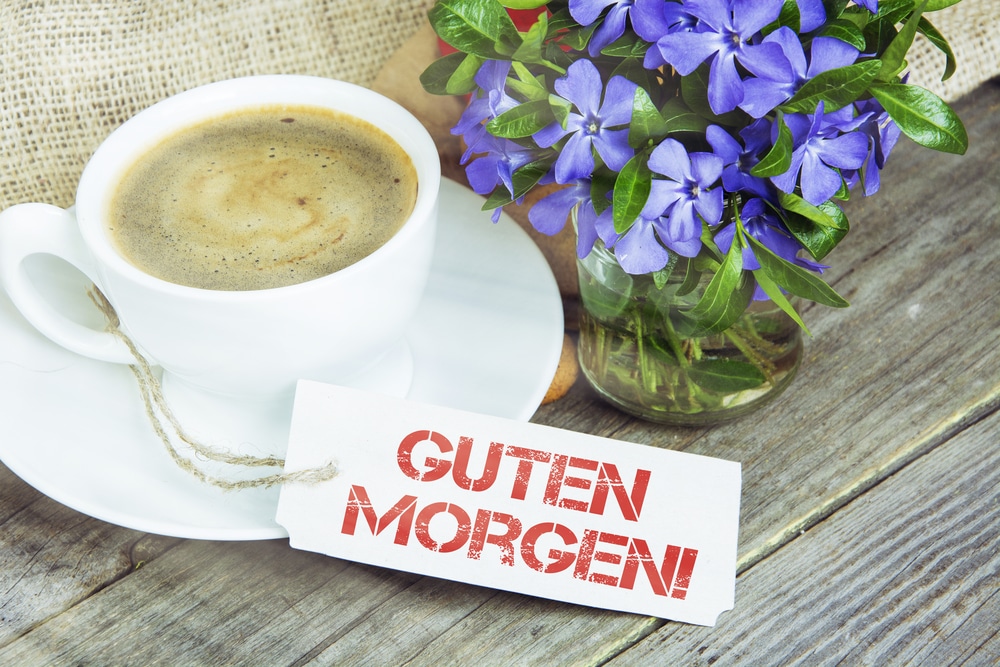"Good Morning" in German is "Guten Morgen". This greeting is a common way to start the day in German-speaking countries.
Mastering basic German greetings is essential for any traveler or language learner. Saying "Guten Morgen" to someone offers a friendly touch and showcases respect for the local culture. It's often the first phrase learned in German, reflecting the importance of polite salutations in daily interactions.{fullWidth}
{getToc} $title={Table of Contents} $count={true} $expanded={false}
Whether you're in a cozy café in Berlin, a bustling street in Vienna, or amidst the Swiss Alps, this simple yet impactful phrase lets you connect with people on a personal level. Dive into the German language, and you'll quickly discover that such greetings are the cornerstone of everyday conversation, setting a warm and inviting tone for the day ahead.
Why Learning Basic Greetings Is Important
Greeting someone in their own language breaks walls. It's a sign of respect and shows a willingness to engage on a personal level. In Germany, saying ‘Good Morning’ in German can make a huge difference in how people perceive you. Let’s dive into why basic greetings matter.
Building Rapport
Starting conversations is easier with a cheerful 'Guten Morgen!' It can change the start of any interaction. A warm greeting creates a friendly environment where rapport builds quickly.
- It shows effort in communication.
- Opens doors to more in-depth conversations.
- Makes you approachable and friendly.
Cultural Understanding
Understanding 'Good Morning' in German is about more than just words. It's a dive into culture. You learn when and how to use it, showing cultural sensitivity and awareness.
- Respect local traditions and customs.
- Enhance your travel experience.
- Appreciate the nuances of German daily life.
Every basic phrase learned is a step towards meaningful interactions. So, take that step and say 'Guten Morgen' with confidence.
How to pronounce good morning in German?
- Goo: Similar to the English word "goo," but with a shorter 'oo' sound.
- Ten: Pronounce it like the English number 'ten,' but with a softer 'e,' almost like 'tuhn.'
- Mor: The 'o' in "mor" should sound like the 'o' in "more" or "for." Make sure to roll the 'r' slightly.
- Gen: Pronounced like 'gain' in English, but with a softer 'e' and a more pronounced 'g' sound at the beginning.
Different Ways To Say Good Morning In German
Mornings in Germany begin with a friendly greeting. The German language offers different ways to say "Good Morning" based on the context. Know these phrases to start your day like a local.
Formal Greetings
When addressing someone formally in Germany, especially in a professional setting, use "Guten Morgen". This phrase shows respect and is suitable when speaking to superiors or strangers. In Germany, formal greetings are essential to make a positive impression.
- Guten Morgen – Good Morning (Formal and respectful)
- Morgen – Short for 'Good Morning' (Still formal but less formal)
Informal Greetings
With friends or family, Germans use a more casual tone. "Moin!" is popular in northern Germany and carries a friendly, light-hearted vibe. It's common among close acquaintances and peers. Here are a few informal German morning greetings:
- Moin! – Hi! (Northern Germany)
- Morgen! – Morning! (Casual)
- Servus! – Hello! (Used in Southern Germany and Austria)
| German | Pronunciation | English Translation |
|---|---|---|
| Guten Morgen | goo-ten mor-gen | Good Morning |
| Morgen | mor-gen | Morning (informal) |
| Fröhlichen Morgen | froh-li-hen mor-gen | Cheerful Morning |
| Guten Tag | goo-ten tahg | Good Day (morning usage) |
| Moin | moin | Morning (Northern Germany) |
| Moin Moin | moin moin | Morning (emphasized, Northern Germany) |
| Servus | ser-voos | Hello/Hi (Southern Germany/Austria, morning usage) |
Frequently Asked Questions On Good Morning In German
What Is The Traditional German Greeting For Morning?
In Germany, the most common morning greeting is "Guten Morgen. " It's used to say "Good Morning" in a formal and friendly situation alike.
How Do Germans Say Good Morning Informally?
Informally, Germans might simply say "Morgen" as a shortened version of "Guten Morgen. " It's a casual way to greet friends or peers in the morning.
Can "guten Morgen" Be Used All Day?
No, "Guten Morgen" is only appropriate during morning hours. After midday, Germans typically switch to "Guten Tag" for "Good Afternoon" or "Guten Abend" for "Good Evening. "
What Are Variations Of Morning Greetings In German?
Apart from "Guten Morgen," Germans might say "Schönen Morgen" for a pleasant morning or use "Moin" in Northern Germany, which is akin to "Morning. "
Conclusion
Mastering the German greetings for the morning sets a positive tone for your interactions throughout the day. Whether it's a casual "Guten Morgen" or the more formal "Einen schönen guten Morgen," your effort to communicate will be appreciated. Let these phrases open doors to new friendships and deeper cultural understanding as you embrace the Germanic way of starting the day with warmth and courtesy.
Embrace each morning with a cheerful 'Guten Morgen' and watch the language barriers crumble!


